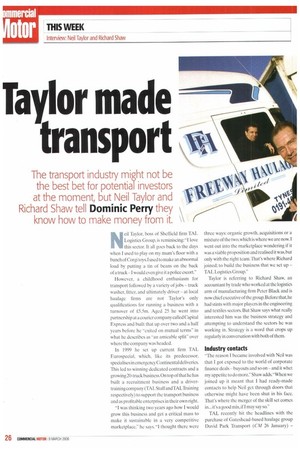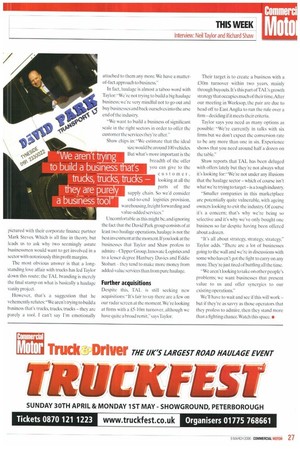Taylor made
Page 26

Page 27

If you've noticed an error in this article please click here to report it so we can fix it.
transport vA
The transport industry might not be the best bet for potentia investors at the moment, but Neil Taylor and V 1% Richard Shaw tell Dominic Perry they \ know how to make money from it. \\
Neil Taylor, boss of Sheffield firm TAL Logistics Group, is reminiscing: "I love this sector. It all goes back to the days when I used to play on my mum's floor with a bunch of Corgi toys.! used to make an abnormal load by putting a tin of beans on the back of a truck —I would even give it a police escort."
However, a childhood enthusiasm for transport followed by a variety of jobs — truck washer, fitter, and ultimately driver — at local haulage firms are not Taylor's only qualifications for running a business with a turnover of £5.5m. Aged 25 he went into partnership at a courier company called Capital Express and built that up over two and a half years before he "exited on mutual terms" in what he describes as an amicable split" over where the company was headed.
In 1999 he set up current firm TAL Eurospecial, which, like its predecessor, specialises in emergency Continental deliveries. This led to winning dedicated contracts and a growing 20-truck business. On top of that he has built a recruitment business and a drivertraining company (TAL Staff andTALTraining respectively) to support the transport business and as profitable enterprises in their own right.
"I was thinking two years ago how I would grow this business and get a critical mass to make it sustainable in a very competitive marketplace." he says. "I thought there were three ways: organic growth, acquisitions or a mixture of the two, which is where we are now.! went out into the marketplace wondering if it was a viable proposition and realised it was, but only with the right team.That's where Richard joined; to build the business that we set up — TAL Logistics Group."
Taylor is referring to Richard Shaw, an accountant by trade who worked at the logistics arm of manufacturing firm Peter Black and is now chief executive of the group. Before that, he had stints with major players in the engineering and textiles sectors. But Shaw says what really interested him was the business strategy and attempting to understand the sectors he was working in. Strategy is a word that crops up regularly in conversation with both of them.
Industry contacts
"The reason I became involved with Neil was that I got exposed to the world of corporate finance deals — buyouts and so on — and it whet my appetite to do more," Shaw adds." When we joined up it meant that I had ready-made contacts to help Neil get through doors that otherwise might have been shut in his face. That's where the merger of the skill set comes in...it's a good mix, if I may say so."
TAL recently hit the headlines with the purchase of Gateshead-based haulage group David Park Transport (CM 26 January) — pictured with their corporate finance partner Mark Steves. Which is all fine in theory, but leads us to ask why two seemingly astute businessmen would want to get involved in a sector with notoriously thin profit margins.
The most obvious answer is that a longstanding love affair with trucks has led Taylor down this route: the TAL branding is merely the final stamp on what is basically a haulage vanity project.
However, that's a suggestion that he vehemently refutes: "We aren't trying to build a business that's trucks, trucks, trucks — they are purely a tool. I can't say I'm emotionally attached to them any more. We have a matterof-fact approach to business."
In fact, haulage is almost a taboo word with Taylor: "We're not trying to build a big haulage business; we're very mindful not to go out and buy businesses and back ourselves into the arse end of the industry.
"We want to build a business of significant scale in the right sectors in order to offer the customer the services they're after."
Shaw chips in: "We estimate that the ideal size would he around 100 vehicles. But what's more important is the breadth of the offer you can give to the C ustomer, looking at all the parts of the
trucks, truc , truc —
supply chain. So we'd consider end-to-end logistics provision, warehousing, freight forwarding and value-added services."
Uncomfortable as this might be, and ignoring the fact that the David Park group consists of at least two haulage operations, haulage is not the best investment at the moment. If you look at the businesses that Taylor and Shaw profess to admire— Clipper Group, innovate Logistics and to a lesser degree Hanbury Davies and Eddie Stobart — they tend to make more money from added-value services than from pure haulage.
Further acquisitions
Despite this, TAL is still seeking new acquisitions: "It's fair to say there are a few on our radar screen at the moment. We're looking at firms with a £5-10m turnover, although we have quite a broad remit," saysTaylor. Their target is to create a business with a £30m turnover within two years, mainly through buyouts. It's this part of TA! .'s growth strategy that occupies much of their time.After our meeting in Worksop, the pair are due to head off to East Anglia to run the rule over a firm — deciding if it meets their criteria.
Taylor says you need as many options as possible: "We're currently in talks with six firms but we don't expect the conversion rate to be any more than one in six. Experience shows that you need around half a dozen on the table."
Shaw reports that TAL has been deluged with offers lately but they're not always what it's looking for: "We're not under any illusions that the haulage sector — which of course isn't what we're trying to target —is a tough industry.
"Smaller companies in this marketplace are potentially quite vulnerable, with ageing owners looking to exit the industry. Of course it's a concern; that's why we're being so selective and its why we've only bought one business so far despite having been offered about a dozen.
"It's all about strategy, strategy, strategy," Taylor adds. "There are a lot of businesses going to the wall and we're in discussions with some who haven't got the fight to carry on any more.They're just tired of battling all the time.
"We aren't looking to take on other people's problems: we want businesses that present value to us and offer synergies to our existing operations."
We'll have to wait and see if this will work — but if they're as savvy as those operators that they profess to admire, then they stand more than a fighting chance. Watch this space. •
































































































































































































